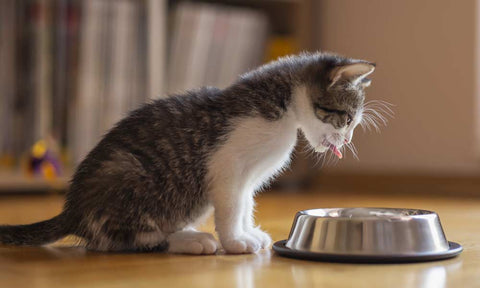Is our number one priority
The Ultimate Guide to Feeding Your Kitten

It's crucial to feed your new kitten a high-quality, nutritionally balanced meal that is suitable for their age, weight, and activity level.
At the age of 4-6 weeks, kittens usually start to wean themselves from their mother's milk. The kittens eventually move from nursing to solid food consumption over the course of many weeks. Most kittens will have totally quit breastfeeding by the time they are 8 to 12 weeks old and start eating solid food on their own.
It is crucial to remember that the weaning procedure might change based on the kitten and their own demands. Others kittens might wean sooner or later than others, and some might nurse from their mother even after they start eating solid food for a short while.
Specialised diet
To assist their growth and development, kittens should be given a diet designed just for them, one that is rich in protein and fat. For kittens, wet or canned food is frequently advised since it has more calories per serving and more moisture than dry food, both of which are crucial for maintaining hydration. You can also give your cat high-quality dry kitten food, but always remember to give them access to clean water.
It's crucial to study food labels and search for high-quality kitten food, which should list a protein source as the first ingredient and is especially prepared for kittens with their developing nutritional requirements.
Feeding schedule
It is also crucial to remember that kittens' little stomachs can't take big meals, so they should instead be fed small, regular meals throughout the day. To prevent stomach discomfort, you should also gently introduce your kitten to their new diet over the course of a week.
With their mother's milk or a premium kitten formula as their main source of nourishment, kittens aged 4-6 weeks should be fed small, frequent meals (approximately every 2-3 hours) throughout the day.
When introducing solid food to kittens between the ages of 6 and 8 weeks, the number of feedings per day should be gradually reduced. In addition to their mother's milk or formula, they should still be given short, frequent meals (every 3 to 4 hours) throughout the day.
Kittens should be eating solid food on their own by the time they are 8 to 12 weeks old, and they normally receive 3 to 4 tiny meals each day.
Kittens should start eating solid food on their own when they are 12 weeks old, and they can have two to three meals per day.
These are merely basic recommendations, and the precise feeding plan for your kitten may change based on their age, weight, and level of activity. The best way to decide on your kitten's feeding schedule and quantity quantities is to speak with a veterinarian.
The kitten's feeding schedule should be altered as it grows, and by the time it is 6 months old, it can be fed twice daily. Once the kitten reaches the age of a year, its diet should gradually transition to adult food.